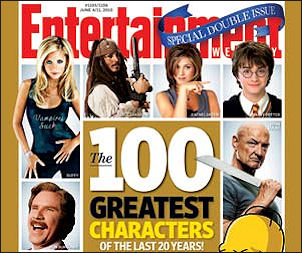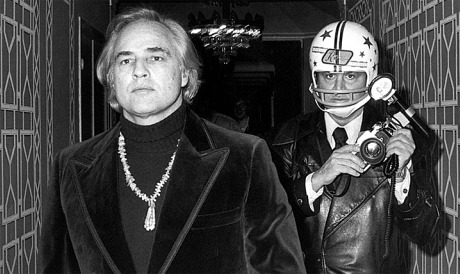In Get Him To The Greek, Jonah Hill “looks to have expanded to Macy’s-parade balloon size since Superbad but plays the same prematurely middle-aged guy he did there.” — Time‘s Richard Corliss in a 6.3 review.
Daily
Character-Defining
Another thing I’m late on due to recent travelling is Entertainment Weekly‘s 6.1 cover story — “The Greatest Characters of the Last 20 Years.” The fact that EW has essentially become an Eloi under-25 girlie magazine explains why some of the most intriguing characters are near the bottom of the list and some of the blandest are near the top — naturally!

HE reader Kurt Bainer explains it as follows: “Wow, talk about upside-down rankings! There are a ton of characters at the bottom who should be at the top, and some that don’t even belong on the list in the first place.
“I have no problem with Homer J. Simpson as # 1 — still going strong after 21 years — but consider the placement of the following:
“#99 — Kill Bill‘s The Bride (i.e., Uma Thurman). #95 — Jim Carrey‘s Truman from The Truman Show. #90 — Marge Gunderson (Frances McDormand) in Fargo — should be in the top 20. #85 — Daniel Day Lewis‘s Daniel Plainview in There Will Be Blood — should be among the top 15 or 20. #64 — Russell Crowe‘s Maximus in Gladiator — deserves placement among the top 30 or 40. #52 — Kathy Bates‘ Annie Wilkes in Misery — should reside among the top 10-20.
“Not to mention Kevin Spacey‘s Keyser Soze in The Usual Suspects at #37 — clearly a top-20 character. Or Vincent Vega/Jules Winnfield of Pulp Fiction at #29 — they should be among the top 15. #14 — Jeff Bridges‘ Jeff Lebowski in The Big Lebowski — should be among the top 5-10. #4 — James Gandolfini‘s Tony Soprano in The Sopranos — should definitely be #1.
“Now think about these names having been placed higher than those listed above…
“#48 — the Harold and Kumar guys; #40 — Will Ferrell‘s Ron Burgundy. #28 — Tyler Perry‘s Madea. #24 — Felicity (please). #20 — Ally McBeal (should she even be on this list?). #9 — Carrie Bradshaw of Sex and The City — deserves to be somewhere between 50th and 75th place. #6 — Jennifer Aniston‘s Rachel Green on Friends. #3 — Buffy The Vampire Slayer (Buffy over Tony Soprano?).”
2010 Eloi Awards
I caught all but the first 20 minutes of last night’s MTV Movie Awards, and was stunned by the absence of even half-funny material throughout most of it. The show’s popularity derives from its blatant goof-off attitude and being 100% opposed to the idea of movie theatres as churches. Movies are presented instead as things you might watch on your iPhone while farting and belching during a McDonalds break. So you’d think that at least some of the routines would be at least chuckle-worthy, except almost nothing worked.

With the exception of Tom Cruise‘s Les Grossman dance number with Jennifer Lopez and Jonah Hill and Russell Brand‘s make-out session in the seats, pretty much every line and routine had a “that’s it?” quality. Nobody seemed to have the slightest clue. Time and again the show stalled and sputtered.
I said to my son Dylan, “Is it me or is almost nothing on this show even remotely funny? I mean, I’m sitting here frowning.”
It doesn’t seem to have occured to anyone (least of all the writers) that low-road wallowing is never funny unless fortified by exceptional wit, smarts, sophistication. Or political subversiveness. Or some display of outrageous, never-seen-before vulgarity or razzle-dazzle (like the Cruise-Lopez routine). Instead the show was mostly an assemblage of glittery ca-ca moments.
Will Ferrell and Mark Wahlberg dangling from wires and bitching about how it didn’t feel cool enough?
It would have been nice — change-of-pace classy — if “Best Kiss” winners Kristen Stewart and Robert Pattinson had simply kissed in the classic tradition. But no — they had to go with a tiresome routine about Pattinson being too clumsy to pull if off. It was awful. This plus Stewart’s cowardice over the rape remark has lowered her stock considerably.
Bradley Cooper‘s witless blathering-on as he introduced special honoree Sandra Bullock (particularly the beaming look in his eyes as he spoke of the $163 million earned by The Proposal) persuaded me that he’s a giddy and fizzy-souled showbiz whore. I began to admire Cooper after seeing him in The Hangover, but I’m off the boat now. His stupidly grinning puss had the exact opposite effect that Ben Stiller‘s Oscar show routines (the Na’vi thing, the ’09 Joaquin Phoenix parody, that great bit he did years ago with Owen Wilson) have had — i.e., he gets it, he’s cool.
And in the middle of all this Ken Jeong (The Hangover), while accepting the Best WTF Moment award, starts crying about his wife having dodged cancer? Now I’ve got a handle on the guy — he has the soul of an owner of a Monterey Park Chinese food restaurant who drives a big car and lives in a tract house.
Okay, the Jeong-Ed Helms Elton John routine wasn’t too bad. Christina Aquilera‘s light-up crotch was striking. And I was mildly aroused by the trailer for Harry Potter and the Deathly Hallows.
New Moon was named Best Movie, and Stewart won the Best Female Performance award for sleepwalking through it? The emptiest Eloi GenY girls would have trouble with those calls. And Zach Galifianakis won the Best Comedic Performance for playing an all-but-diaper-wearing retard in The Hangover when the general consensus is that Ed Helms’ performance stole it?
Bark
There’s a difference between taking a hold-your-nose, straight-paycheck acting job in some deplorable mainstream monstrosity (i.e., Johnny Depp in the Pirate movies, John Cusack in 2012) and having a nice little gig going with the family trade. Nearly all CG-mounted family films are atrocious (i.e., Furry Vengeance), but I’m not feeling the revulsion over Owen Wilson‘s Marmaduke voicing, despite the 11% Rotten Tomatoes rating and the weak opening numbers.
The bottom line is that Marmaduke plus Marley and Me has made Wilson the go-to GenX guy for family dog movies. If he’s smart he’ll play this like Donald O’Connor did with the Francis the Talking Mule movies in the ’50s and dog it as long as he can. Dog movies could be Wilson’s retirement fund/nest egg. Nobody watches them anyway or pays them any mind so who cares? Suck it in, do the job, take a shower.
Responsible Parties
It was reported late last week that Anne Carradine, widow of the late David Carradine, has filed the most absurd wrongful-death lawsuit in world history. The filing essentially claims that MK2 S.A., the producer of Carradine’s last film Stretch, should have hired someone to keep him from accidentally strangling himself to death while jerking off in his Bangkok hotel room.
Which is why I found a 6.4 Huffington Post comment mildly amusing, or at least in keeping with the Anne Carradine spirit: “I’m suing 20th Century Fox [for having] suffered a broken ankle, bulging discs in my neck and lower back, a sprained knee, two chipped teeth, a gash on my forehead and five groin pulls. All of these injuries occurred as a result of fleeing the theater every time the Marmaduke trailer came on (except for the groin pulls — those details are unnecessary).”
Not This Year
Last July’s first-peek-at-Avatar presentation at ComicCon made it imperative to attend. This year the big draw is a Tron Legacy looksee, and I’m not too sure about it. I’m feeling 65% of last year’s juice, if that, and that’s not enough to make me part with the $1600 or $1700 it’ll cost to fly out to LA, rent a car, stay in some crappy-ass motel, cover food-and-drink tabs, etc.

I’m not trying to diminish Tron Legacy or suggest it might not be good. I loved that early trailer they put out, and I’m into the cult of Joseph Kosinski as much as the next guy. I have no reason to believe that he’s not “the next ‘real deal’ in that he’s got a Cameron-like technical knowledge, is responsible with budgets and operates on an even keel…overall a remarkably talented, well adjusted guy,” as a director-writer said a while back. I just don’t think a Tron Legacy product reel-and-pep rally is worth flying across the country for.
I’d shell out if ComicCon was happening in mid-to-late June, and I knew for certain that the very first screening of the fully finished Inception was on the schedule. That would be worth it, no question.
A friend says the only complete movie that he knows will be showing at ComicCon 2010 is Scott Pilgrim vs. The World. Bamboo shoots under my fingernails. The other big attractions are things like Green Lantern and Thor and what-have-you. I have a certain amount of geek fervor in my system, but to be into this year’s ComicCon you have to be 110% into geek theology. You have to be willing to go over the geek waterfalls in a barrel. You have to be Ed Douglas, Katey Rich, Devin Faraci, Drew McWeeny…one of those who exalt in the ComicCon atmosphere. “Whoo-whoo…we’re here! Among our own kind! Doesn’t get any better than this!”
Well, it does get better. A lot better. ComicCon can be (and was last year for me) a moderately bruising experience in terms of getting into the big panels and presentations. You have to call and beg and hustle your way into everything, and that means tons of pre-arrival calls and e-mails and cajolings. Unlike the major film festivals, you can’t just show up at ComicCon and pick up your pass and go to town. It’s much, much more difficult to finagle this San Diego soiree than Cannes, Toronto or Sundance. It’s hard enough to file six or seven or more stories per day under any festival circumstance, but to deal with what I’ve come to regard as ComicCon crap pushes it into the red zone.
Tron Legacy will open on 12.17.10.
Salesman
Meet Marlon Brando is a 25-minute documentary by Alfred and David Maysles. All it is, basically, is footage of Brando schmoozing with journalists at a press junket for Code Name: Morituri, a World War II thriller that costarred Brando and Yul Brynner. And it’s a very cool thing to simply watch Brando as he sidesteps the usual protocol, dumps on the film and charms the shit out of everyone.
Among other things he (a) studies his questioners like a bank officer, squinting his eyes and picking up everything they’re thinking but not saying while interviewing them about their quirks and backgrounds, (b) does whatever he can to avoid discussing the film, (c) jokes around a lot, (d) discusses the plight of American Indians, (e) flirts with each and every female, (f) speaks French and so on.
Pretty Female Journalist: “Just tell us about your new movie.” Brando: “Well….why?”
Morituri opened in the U.S. on 8.25.65 so this junket probably happened two or three weeks before. Here’s part 2 and 3.
The generic impression of Brando is that of a guy who gave up, got fat, stopped caring, blew it big-time as a dad, hated acting and so on. But here, at least, all that self-hating stuff hasn’t taken him yet, and in fact doesn’t seem to have established a foothold. He seems like somebody you’d really like to hang and drink with. Sharp, self-deprecating, perceptive, whimsical.
“The idea was to let scores of television reporters meet the star in order to sell Morituri,” an IMDB poster writes. “Brando, however, had other plans. Declaring that he hates being ‘a hawker’ he turns the situation upside down, interviewing the interviewers, mocking the vacuousness of the set-up and flat-out refusing to promote Morituri.
“Don’t you have anything to say about the film?’ asks an exasperated journalist. Brando replies, ‘Bernie Wicky smokes the worst cigars I’ve ever known!’
“With a lesser personality, this might be perceived as the arrogant posturing of a spoiled movie star, but the mischievous twinkle in Brando’s eyes, combined with the fierce intelligence and wit of his answers, make it a joy to behold. The documentary does not get us any closer to Brando the actor, but it does offer an insightful glimpse into the mind of a man who was too smart to go with the flow, too independent to compromise and who, throughout his life, refused to play by the rules.”
She Caved
Kristen Stewart‘s apology for her “being paparazzi’ed is like being raped” remark in a new British Elle interview is, for me, a matter of some disappointment.
By caving in to pressure and throwing herself upon the mercy of the court Stewart has indicated that for all her slouchy rebel posing in public, she’s no Sean Penn where it counts — i.e., in the backbone.
Instead of explaining to the idiots out there that the term “rape” doesn’t strictly refer to sexual violation — that it means being “invaded and occupied and suffering a kind of brutal violation or wounding or theft, be it physical or emotional,” as I explained last Wednesday — she did exactly what her publicist told her to do and kowtowed to the simple-minded.
“I really made an enormous mistake — clearly and obviously,” Stewart told People two days ago. “And I’m really sorry about my choice of words. ‘Violated’ definitely would have been a better way of expressing the thought [than rape].”
In other words, if you’re a certified, card-carrying moron the word “violated” can allude to sexual assault or being brutalized by paparazzi, but the word “rape” cannot and must not refer to anything other than the former. Hooray for Stewart and her publicist for doing their part to approve and ratify American stupidity.
Somebody get in touch with Roberto Paglia and explain that his “Best of Sicily” article called “The Rape of Palermo” constitutes a woefully insensitive use of the term, and that he needs to take out ads in newspapers and on websites worldwide and apologize to all the women who’ve been offended.
Re-Acknowledging Agora
I didn’t comment on the 5.28 theatrical debut of Alejandro Amenabar‘s Agora because I was in Europe, but now that I’m back and domesticated I may as well re-run my 5.18.09 Cannes Film Festival review, which began with my calling it “a visually ravishing, intelligently scripted historical parable about the evils of religious extremism.
“And I don’t mean the kind that existed in 4th century Alexandria, which is when and where this $65 million dollar epic is set. I mean the evils of the present-day Taliban and the Neocon-aligned Christian right, and the way Agora metaphorically exposes these movements for what they are.
“As Adam Curtis‘s The Power of Nightmares sagely explained, these two extremist faiths are similar in their loathing for liberalism and militant yearning to turn back the clock and to above all hold high the flag of religious purity. The 9/11 attacks kicked off their holy war against each other — a war that fortified their positions in their respective cultures during the Bush years.
“And now comes Agora, dramatizing how purist zealotry among 4th Century Christians led to the persecuting of Jew and pagans, to the sacking and burning of the great library of Alexandria, and to the murder of Hypatia (Rachel Weisz), the first widely-noted female scholar who taught philosophy, astronomy and mathematics. (Note to whiners: Noting a well documented event that happened 1600 years ago can’t be called a spoiler.)
“Amenabar’s film, an English-language Spanish production that was shot in and around Malta, seems to me like the most thoughtful and intellectually-talky big-screen epic ever made, although there’s a fair amount of strife and sword-stabbing and mob violence all through it.

“The intense conflicts, exacting and cultured dialogue, dashing visual energy and top-notch performances from Weisz, Max Minghella, Oscar Isaac, Rupert Evans, Ashraf Barhom, Rupert Evans and Michael Lonsdale make Agora more than gripping for its entire 141 minutes. I was surprised, really, that it moved as fast as it did.
“Some are calling it too talky or insufficiently emotional, which translates into the imprecise term known as ‘boring.’ It isn’t that, trust me, although I admit it’s hard to imagine the U.S. fans of sludge entertainment being keen to see it. You need to be keyed into what it’s saying about our world and to be rooting against the bad guys (i.e., old-time Christians) to really get into it, I suppose, although the high-quality sheen is unmistakable in every department. It’s well worth it for the CG alone.”
Goombah
Leon Gast‘s Smash His Camera, the HBO doc about the legendary, fearless, pain-in-the-ass paparazzo Ron Galella, does a solid, professional job with the usual portraiture. Who he is and was, career recap, what his friends and detractors think and remember, etc. It’s smart, tight, well assembled.
But the most intriguing thing Smash His Camera does is underscore — prove — one of the more intriguing philosophical points made by Marlon Brando‘s Col. Walter E. Kurtz in Apocalypse Now.
Describing some thorny-tough Vietcong he’d fought in Vietnam, Kurtz said “you have to have men who are moral, and at the same time who are able to utilize their primordial instincts to kill without feeling, without passion, without judgment…without judgment! Because it’s judgment that defeats us.”
Replace “kill” with “take pictures of celebrities” and that’s a pretty good summary of Galella’s approach to his rather sleazy profession. He doesn’t judge himself — can’t, won’t, doesn’t know how. And for what it’s worth, he seems like a relatively happy guy. Partly because he does what he does with real feeling and passion. He loves his work.
For decades Galella’s rep among celebrities — including, in their day, Jackie Kennedy and Marlon Brando — has been (a) he is/was New York’s most famous and notorious celebrity photographer, and (b) is/was some kind of Ultimate Insect — an obnoxious thief, invader, stalker, mosquito.
But their scorn doesn’t get through to him. You can see that in his manner and words. Either he’s incapable of understanding what people find infuriating about a paparazzi pest, or he’s shut down that part of him that could understand it.

For the last 40-plus years Galella has presented himself as just a regular New Jersey guy (cannoli-eater, a bit of a primitive, lacking sophistication, not well-educated) who does what he does and gets paid for it, period. He could be a brick-layer or a cab driver, except he lives in an ornate Tony Soprano house and has questionable taste in furnishings and God knows what else.
But he’s a king in his world — renowned, successful — with his photographs published in books and shown in galleries woldwide. And all due (or at least partly due) to the fact that he’s never undermined himself with doubts or concerns. A lesson in this?
In an age in which every paparazzo shoots digitally, Galella — 79 years old — appears to still be shooting on film. Strange. He has a darkroom in his New Jersey home, just like the one that David Hemmings‘ character has in Blow-Up. Quaint.
Smash His Camera will begin showing on HBO on Monday night at 9 pm.
Special Dignity
With the story of Bill Clinton, Hillary Clinton and Tony Blair back in the cultural soup via HBO’s The Special Relationship (which I still haven’t seen), it seems allowable to re-state HE’s longstanding opinion of President Clinton’s fibbing about the Monica Lewsinky mess.
My view is this (and I’m not just saying this to drive up page views): Clinton’s refusal to talk plainly or honestly to Ken Starr‘s inquisitors was one of the moral high points of his administration.
I’ve always thought it slimey and wrong to dredge up the private lives of political candidates. The press corps was right not to pester JFK for his randiness. Jimmy Carter shouldn’t have taken heat for admitting to “lust in his heart.” And beating up on Clinton for Lewinsky was wretched and absurd.
The real issue in ’98 and ’99, of course, wasn’t oral sex, but whether or not an American President should be impeached for lying about having received same, or having otherwise fudged certain particulars under oath. Clinton was not only entitled to lie about this matter; by any standard of dignity he was absolutely honor-bound to do so, given the absolute inappropriateness of such a matter being investigated by lawmakers and given the gutter-grovelling character of many of Clinton’s opportunistic pursuers.

